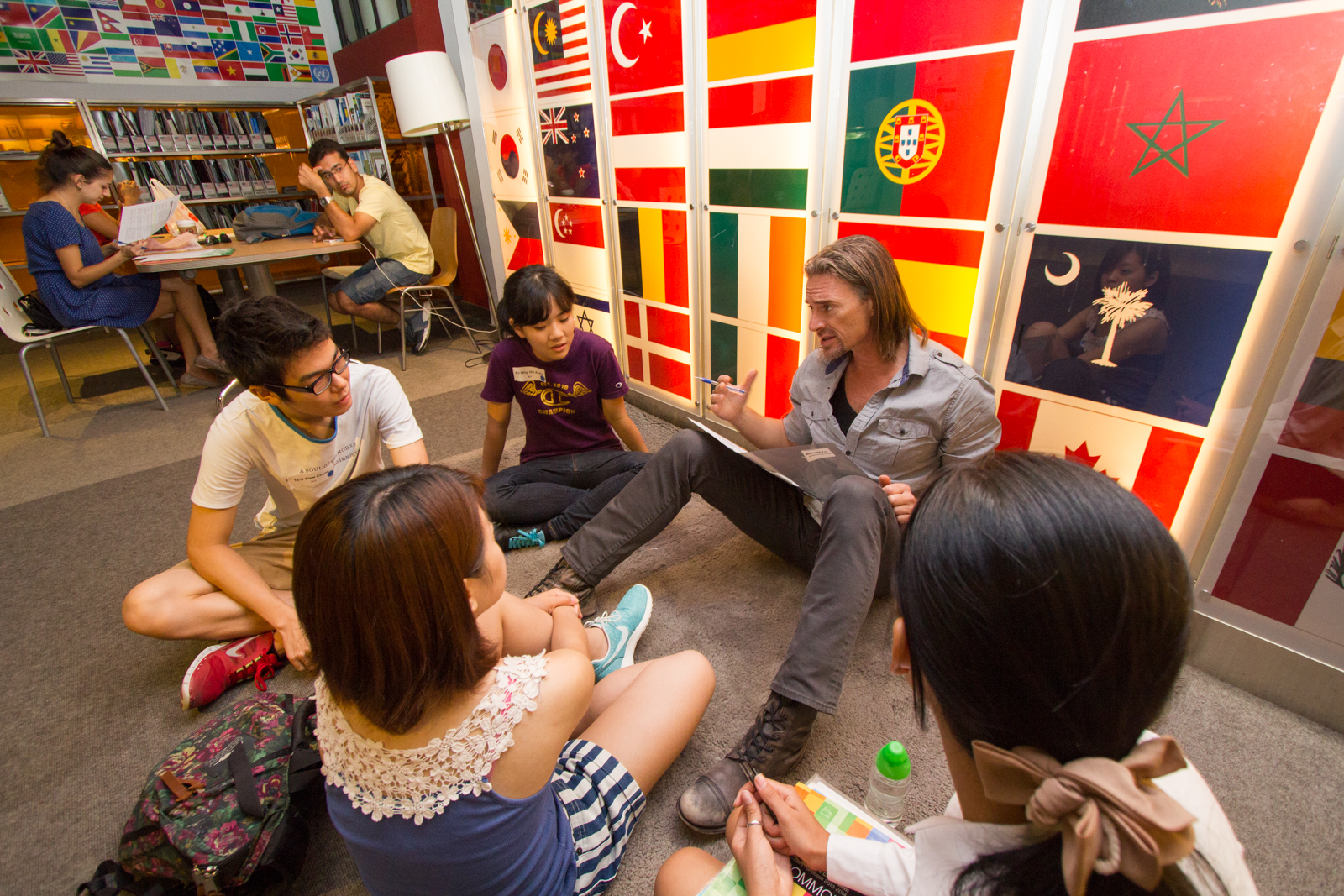From the beginning, with its faculty and its first class of students, the JMSC has been internationally minded. One of the early and continuing classroom mantras was 'think global'.
The attitude underlined the approach the JMSC took to many innovations, conferences, and partnerships over the years. It is particularly true in the case of the internship network it developed to give students real-world experience.
Internship network
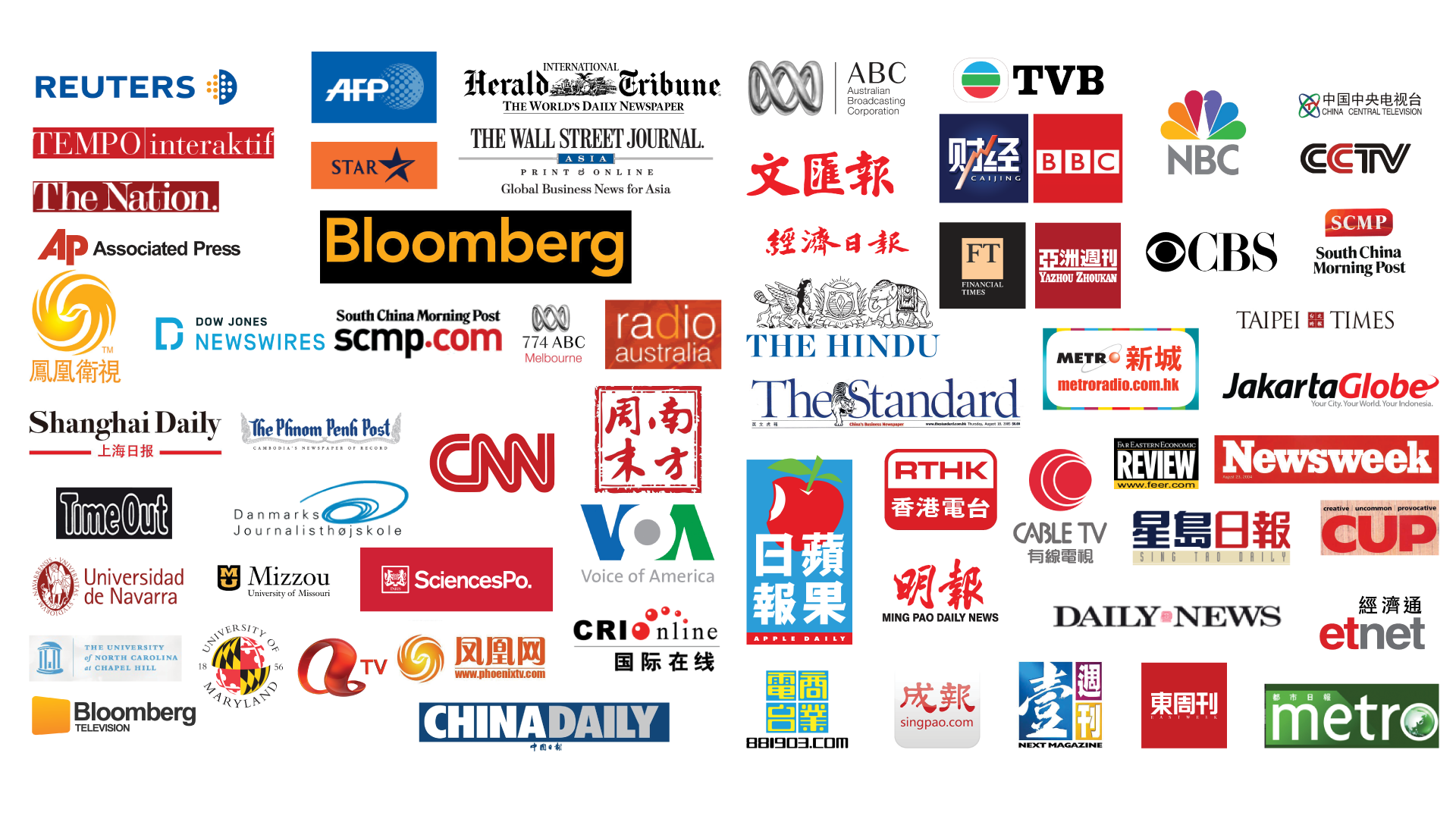
The JMSC began weaving its internship network in Hong Kong before it had even held its first classes. In the summer of 1999, ten undergraduates from various HKU faculties were placed in positions in local print and electronic media.
Over the next few years, the network began expanding rapidly—in Hong Kong and beyond into mainland China, Asia and the West. They included media organisations in Jakarta, Manila, Singapore, Seoul, Kuala Lumpur, Bangalore, Karachi, Melbourne, Cape Town, Copenhagen, New York, Boston, San Francisco, Seattle, Philadelphia and Washington DC.
In 2015, the network continued to expand, with MJ students interning in Myanmar and Nepal.
In either winter or summer internships, students got the opportunity to turn classroom lessons into real-world abilities. In many cases, internships led to full-time employment.
Exchange programmes
The JMSC’s exchange programmes with other top journalism schools offer students the chance to learn and live in Europe and the United States, for either a semester or a year. Through the separately run HKU Worldwide Undergraduate Student Exchange Programme, JMSC students are also able to apply for exchange opportunities at more than 100 universities.
JMSC's exchange partners around the globe:
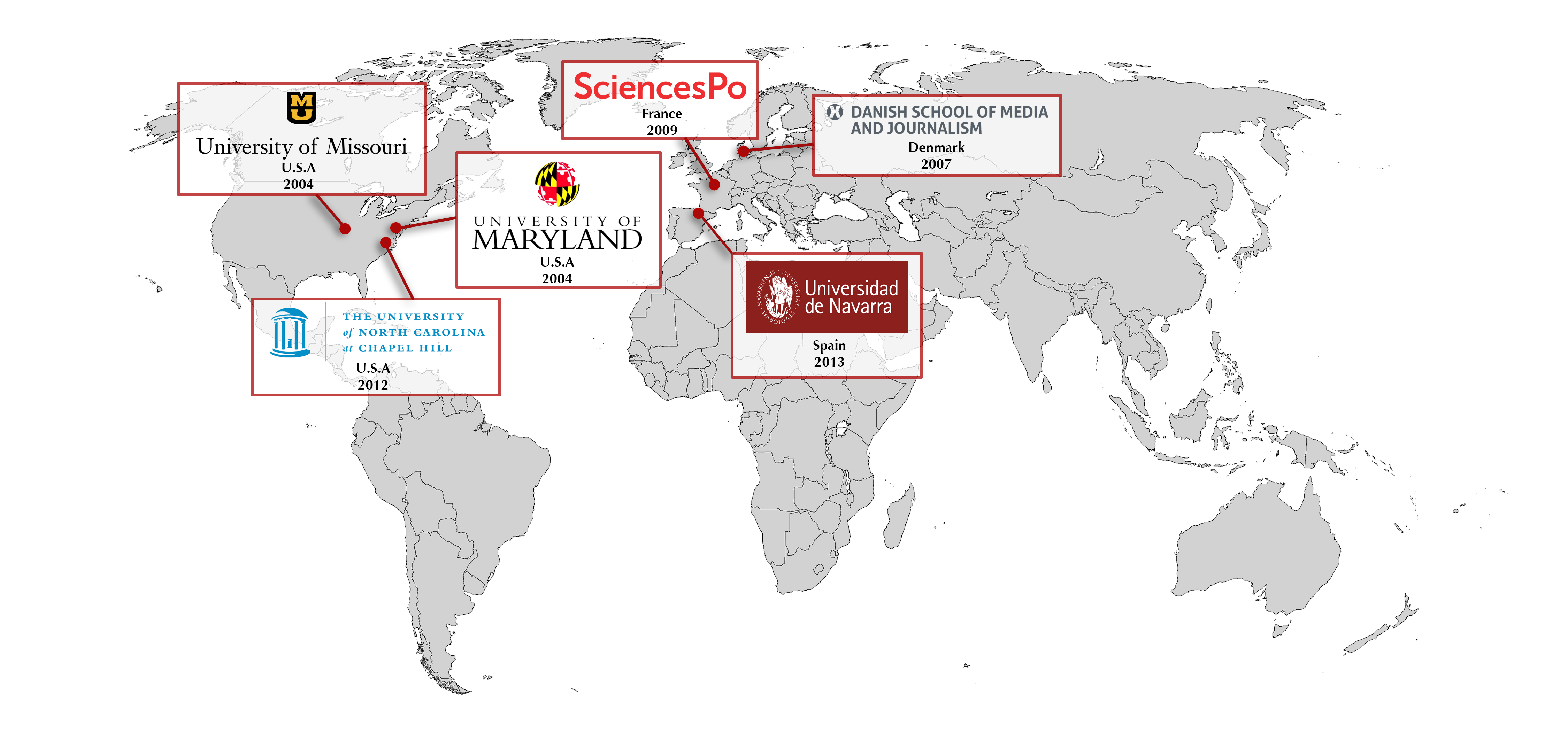
Landmark conferences
The South East Asia Media Defence Litigation Conference (2007)

In May 2007, the JMSC co-hosted the South East Asia Media Defence Litigation Conference. It brought together lawyers and advocates from throughout south east Asia, including Cambodia, Indonesia, Malaysia, Philippines, Singapore, Thailand and Vietnam. Following the conference, the South East Asia Media Legal Defense Network was established; it was the first regional network of lawyers dedicated to defending media freedom and training of legal professionals.
Chinese Internet Research Conference (2008)
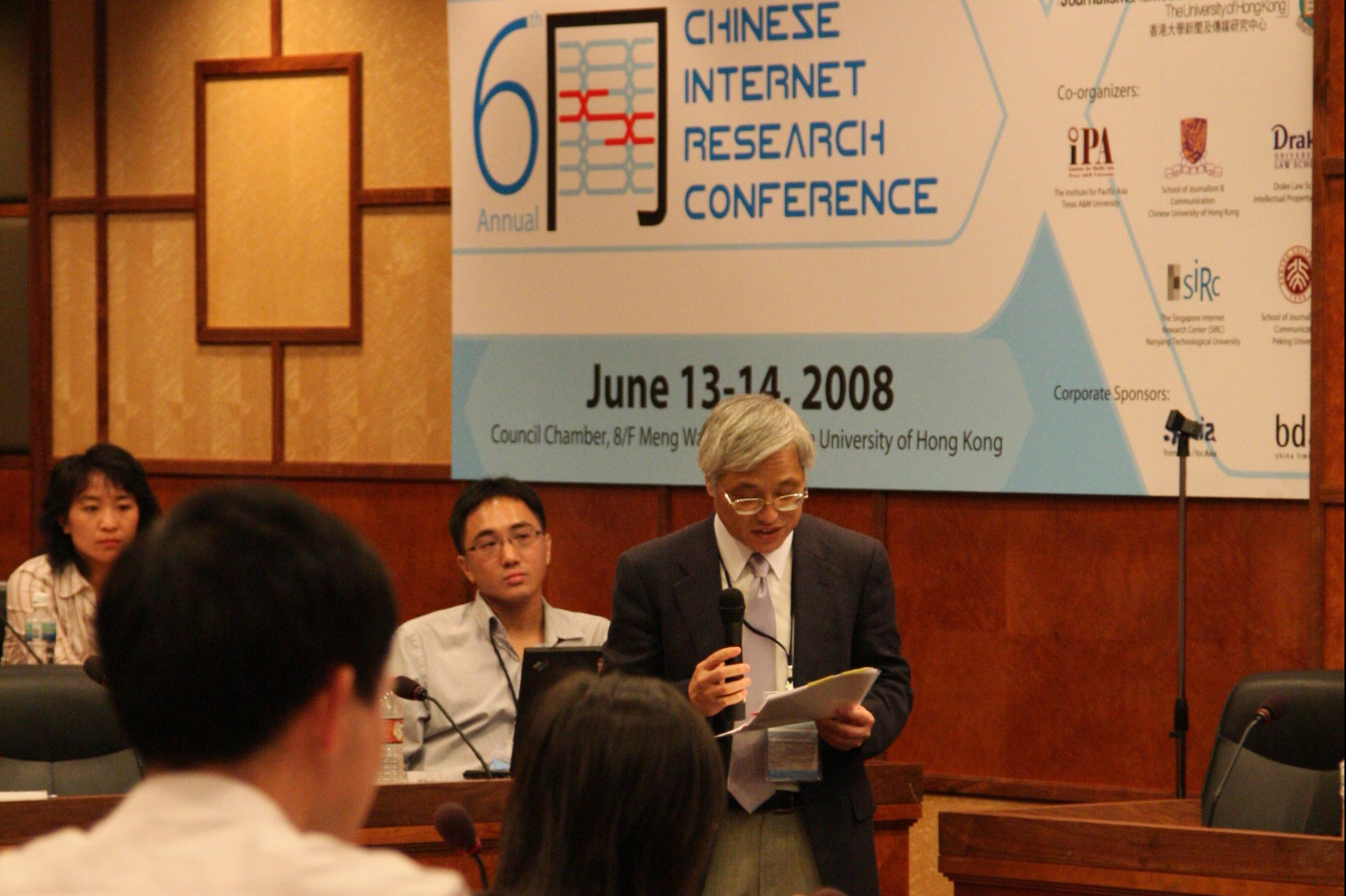
In 2008, the JMSC organised and hosted the sixth annual Chinese Internet Research Conference (CIRC) ‘China and the Internet: Myths and Realities’.
It was the first time the international conference series was held in Hong Kong and it brought together scholars, policy analysts, industry leaders, journalists and legal practitioners from around the world to discuss trends and developments with the internet in China.
East-West Center’s International Media Conference: Reporting New Realities (2010)
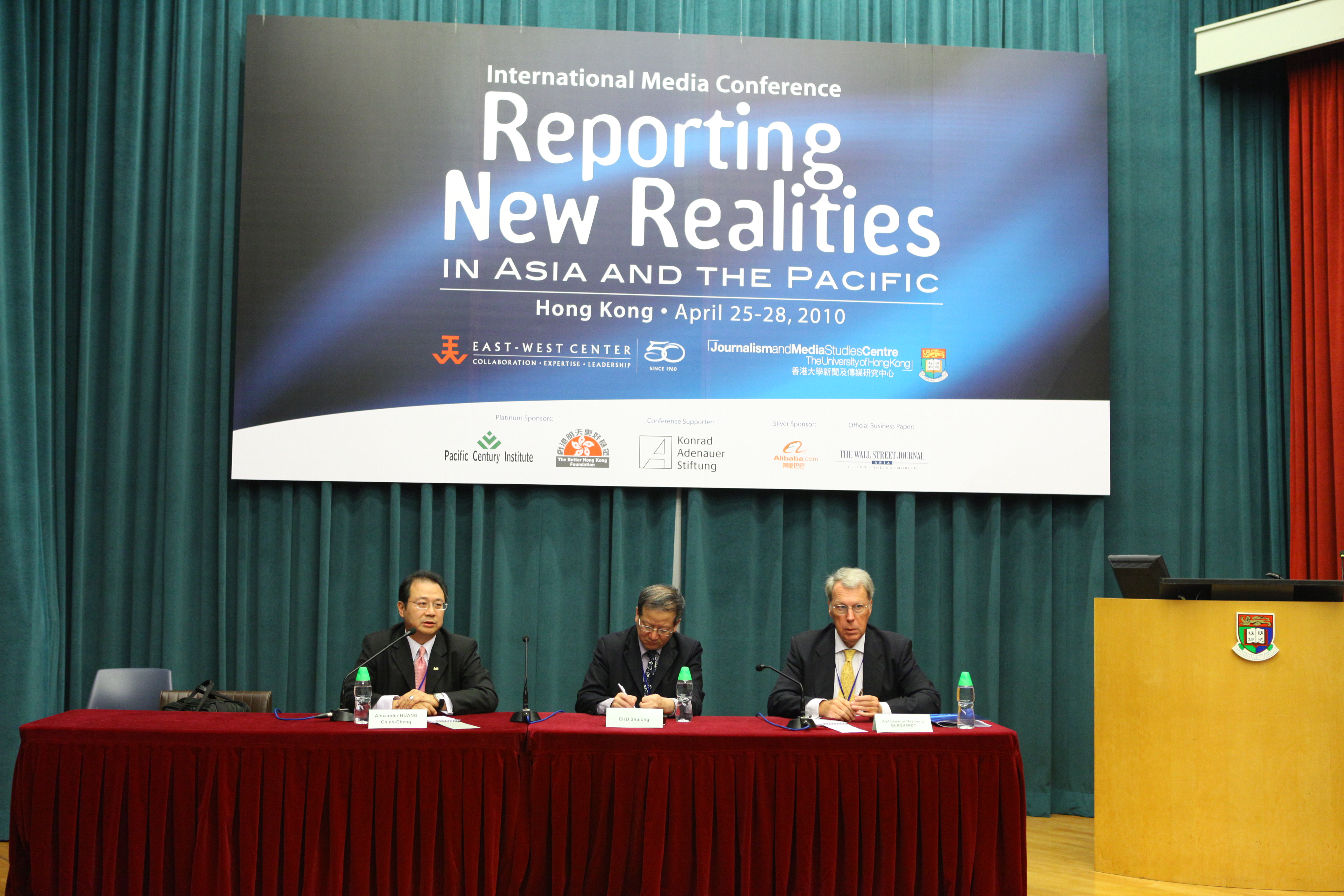
In April 2010, the JMSC co-sponsored and hosted the East-West Center’s second biennial International Media Conference: ‘Reporting New Realities’. JMSC students provided live coverage.
One Year into the Pandemic: Perspectives on Risk and Crisis Communication (2010)
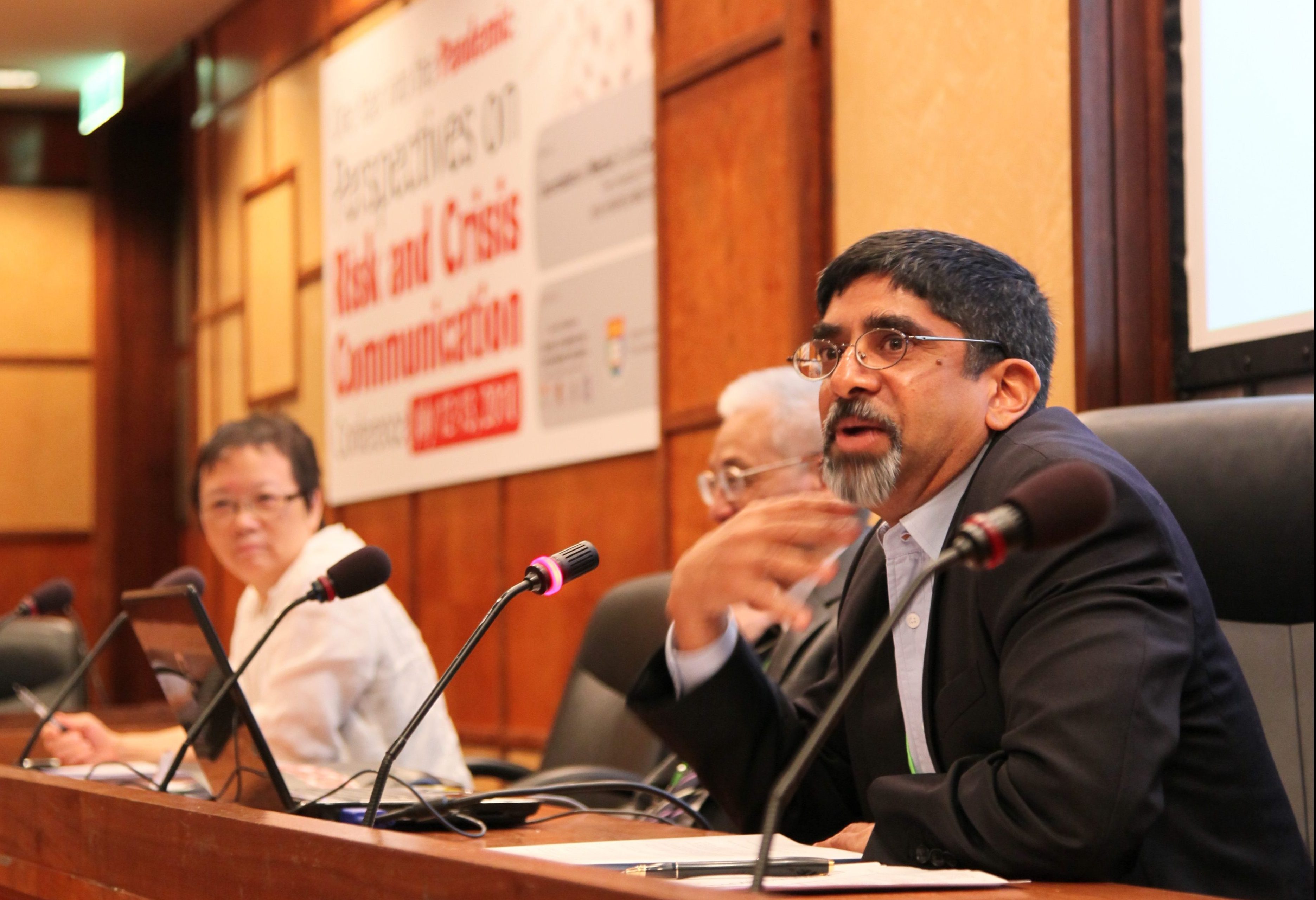
In July 2010, the JMSC hosted a two-day conference, ‘One Year into the Pandemic: Perspectives on Risk and Crisis Communication’, to examine public communication challenges that arose during H1N1 (swine flu) coverage.
Speakers included international and local policymakers, journalists, doctors, and academics across disciplines. The University Grants Committee’s Area of Excellence in Influenza scheme and the Centre for the Humanities and Medicine at HKU co-sponsored the event.
Media Law and Policy in the Internet Age International Conference (2013)
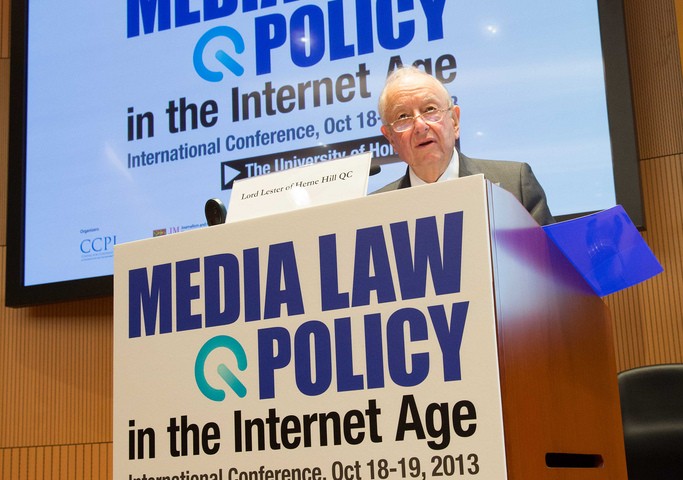
In October 2013, the JMSC co-organised an international conference, ‘Media Law and Policy in the Internet Age’, with the University’s Centre for Comparative and Public Law, and the Media Defense-South East Asia (formerly known as South East Asia Media Legal Defence Initiative). The conference brought together 70 experts from 15 jurisdictions, including three British lords and many top lawyers and academics at the forefront of the debate over issues—reform of media law, defamation, privacy, free speech and national security—spawned by the digital age.
AAJA-Asia’s New Media Conferences (2011 and 2012) and New.Now.Next.Media Conferences (2013 and 2014)
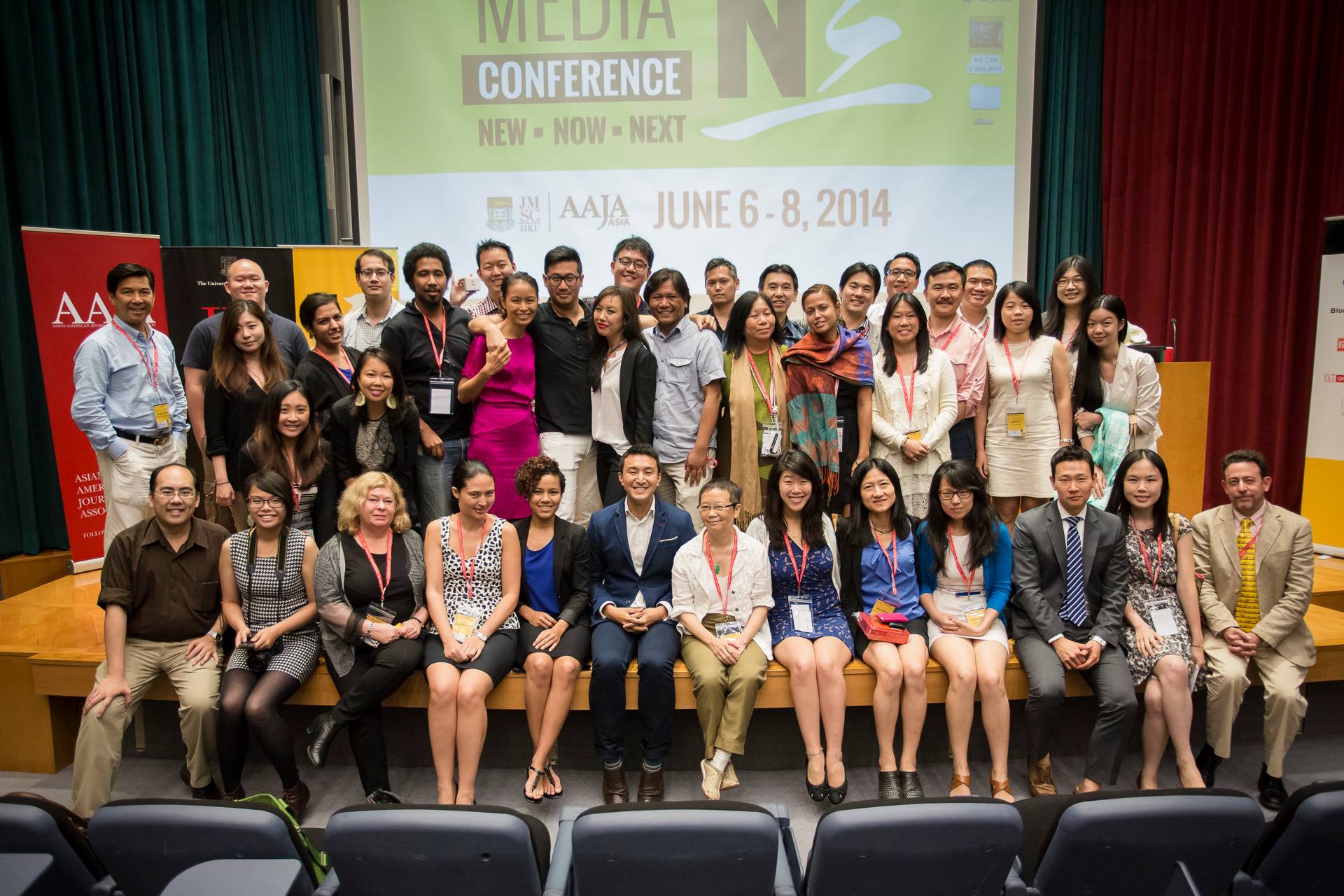
The JMSC hosted and provided live coverage of the Asia Chapter of the Asian American Journalists Association (AAJA-Asia) Asia regional conference at HKU for four years from 2011 to 2014. The 2011 and 2012 conferences were known as the New Media Conferences and the later two were called the New.Now.Next.Media Conference, or N3Con.
In 2013, the conference included a Media Entrepreneurship Pitch Session. It also featured a journalism jobs fair offering students and alumni—and some 220 conference participants―an opportunity to meet editors, journalists and other representatives from international media companies and public relations firms for career advice.
Speakers and events
 Over 800 people attended, and numerous media organisations covered, George Soros' talk in 2010
Over 800 people attended, and numerous media organisations covered, George Soros' talk in 2010
The JMSC has regularly hosted internationally known experts across various fields—in university-wide events as well as in its classrooms.
In February 2010, the JMSC hosted an appearance by international financier and philanthropist George Soros at Lok Yew Hall. More than 800 attended his speech, which was broadcast live online.
In 2008, Lawrence Lessig, former director of the Edmond J. Safra Center for Ethics at Harvard University, visited the JMSC to celebrate the launch of Creative Commons Hong Kong along with Joi Ito, Director of the MIT Media Lab, a world-leading interdisciplinary research laboratory at the Massachusetts Institute of Technology.
In 2009, Human rights lawyer Geoffrey Robertson explored the origin of the notion of human rights in his talk, ‘The Tyrannicide Brief: The Human Rights Story’.
In June 2011, the JMSC co-hosted Mark Stephens, the lawyer for Julian Assange, founder and Editor-in-Chief of Wikileaks.
In November 2011, Pulitzer Prize-winning correspondent Peter Arnett visited the JMSC for a lecture on ‘Video and Villains’. In the same month, Joi Ito, also spoke at HKU again in a talk titled ‘Inspiring Innovation: Creating the Future at the MIT Media Lab’.
In 2012, Pulitzer Prize winning photojournalist, Massoud Hossaini also spoke at the JMSC.
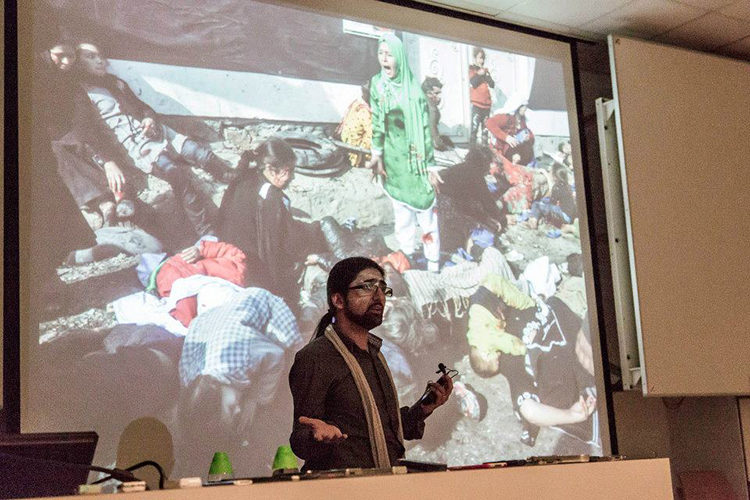
Massoud Hossaini visited the JMSC in 2012
As the JMSC developed its expertise in video and documentary film production, high profile filmmakers appeared at the JMSC to screen their films. In 2004, Hong Kong director and actor Stephen Chow spoke in connection with the release of his Kung Fu Hustle.
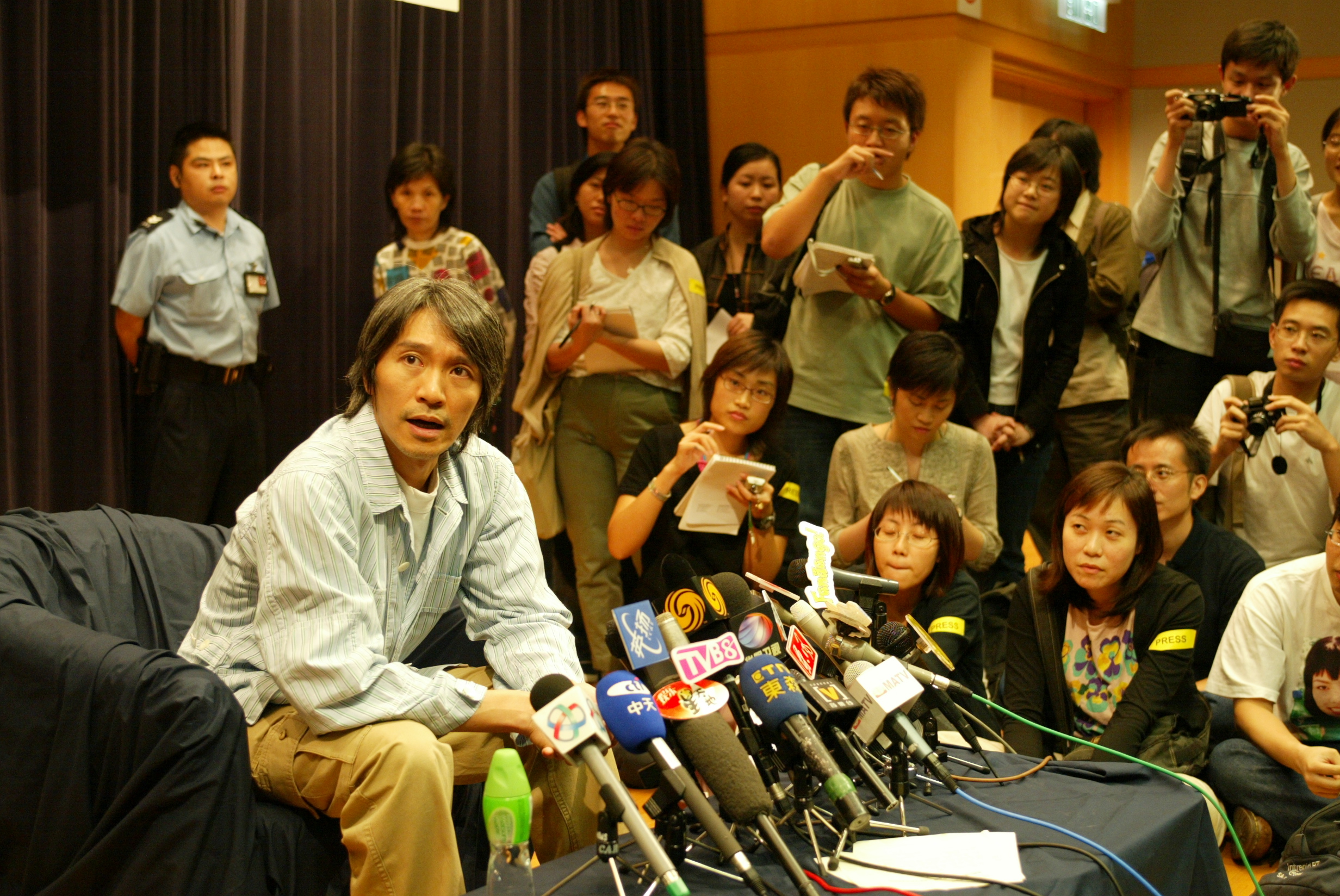

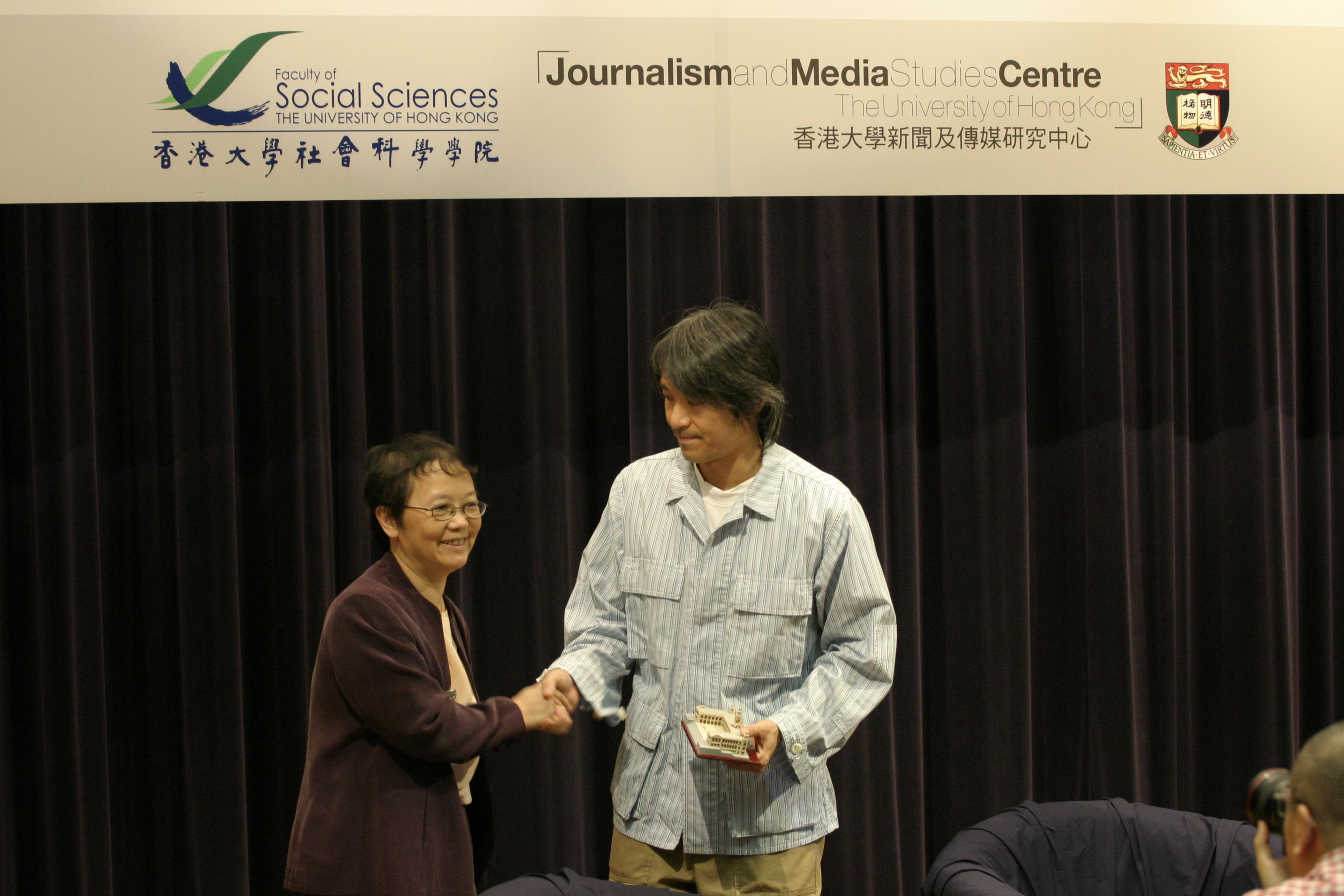

Hong Kong director and actor Stephen Chow received much attention when he came to the JMSC in 2004.
In 2010, historical versions of Sino-Japanese history were discussed at film symposium, ‘History, Trauma and Memory’. It was a collaboration between the Department of Comparative Literature, the School of Chinese, and the JMSC. Visiting Associate Professor at the JMSC, Nancy Tong, also screened her documentary, In the Name of the Emperor, which explored the ‘Rape of Nanking’ in 1937. Chinese filmmaker Li Ying, Executive Producer and Director of Yasakuni, screened his film about visits to the eponymous shrine by Japanese politicians.
 Lung Ying-tai (left) was a Visiting Professor at the JMSC between 2004 and 2006
Lung Ying-tai (left) was a Visiting Professor at the JMSC between 2004 and 2006
Between 2004 and 2006 the JMSC hosted Lung Ying-tai, Taiwanese essayist, cultural critic, and Taipei’s first Cultural Bureau Chief (1999‒2003), as a Visiting Professor. She moderated several talks with local media figures as part of a lecture series called ‘Rethinking Hong Kong’. Topics included ‘The Shifting Cultural Responsibilities of Chinese Newspapers’ (2004) and ‘Civil society on the Move? Reading Beijing, Taipei and Hong Kong through their media’ (2005).
In March 2010, award-winning documentary-maker Fan Lixin answered questions about his film Last Train Home following a screening of the documentary. Also that month, director-writer team Clara Law and Eddie Fong also visited to discuss their work, after travelling to Hong Kong from Australia to screen two films at the 34th Hong Kong International Film Festival: Like a Dream and Red Earth.
Regular classroom speakers over the years have ranged from media professionals such as CNN International news anchor Kristie Lu Stout to legal authorities such as Justice Michael Hartmann, a judge serving in the Court of Appeal of Hong Kong’s High Court, and a local non-permanent judge in the territory's highest court, the Court of Final Appeal.
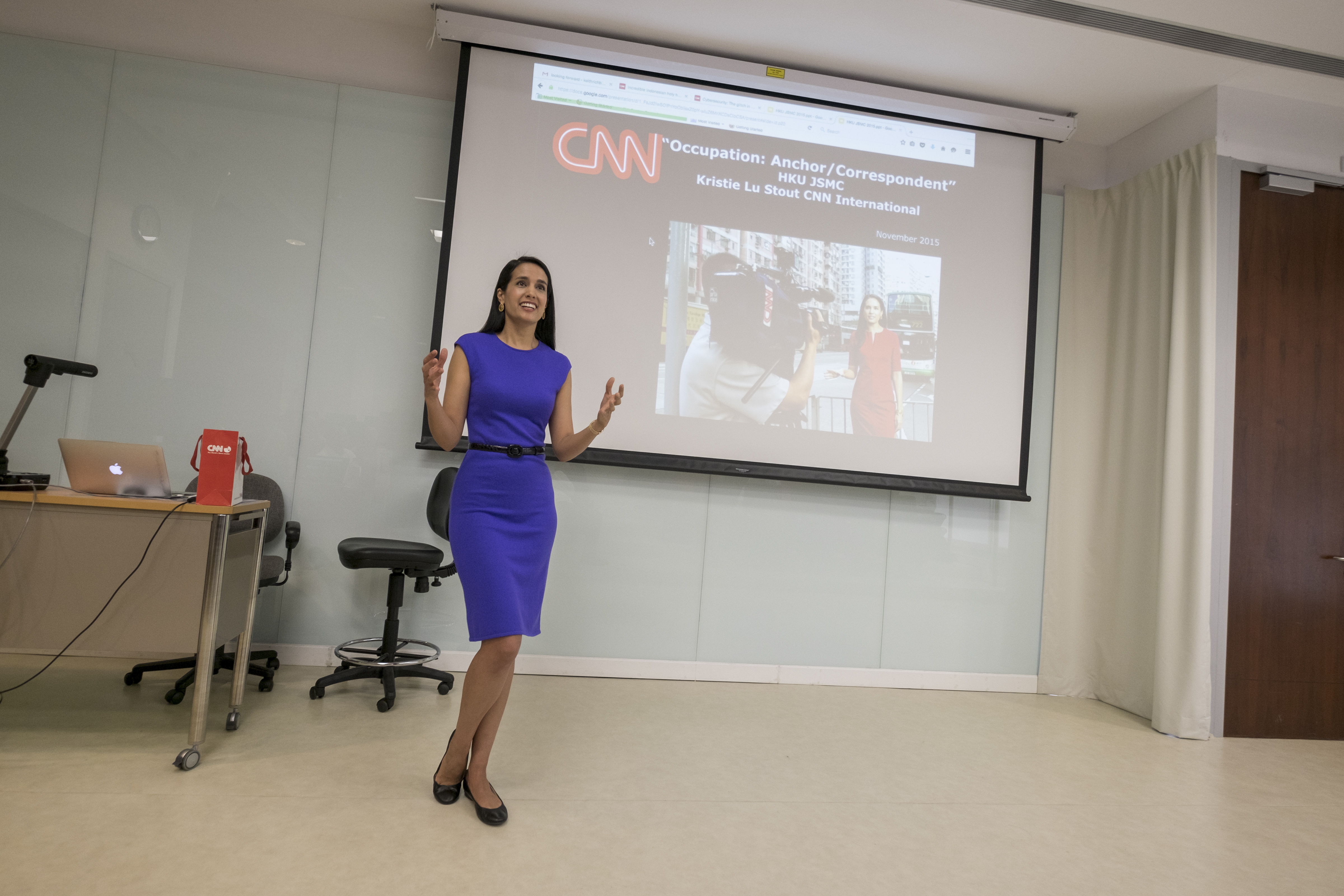 CNN International news anchor Kristie Lu Stout is a regular speaker at the JMSC
CNN International news anchor Kristie Lu Stout is a regular speaker at the JMSCIn 2007, Pulitzer Prize-winning columnist David Finkel spoke by Skype to the Literary Journalism class; Peter Hessler staff writer at The New Yorker magazine, spoke to a HKU audience in an appearance arranged by JMSC. He also spoke to students in the JMSC’s Literary Journalism class.
In the fall of 2008 New York Times Op-Ed columnist Roger Cohen spoke to JMSC undergraduate and graduate students.
From September to December 2009, renowned scholar and cultural critic Lee Ou-fan gave six lectures focusing on strategic ‘moments’ in history where art forms across cultures appear to illuminate each other in the ‘Muse Magazine Distinguished Lecture Series’.
In 2011, the JMSC hosted ‘Visual Moments’, a year-long lecture series on photojournalism, which included a student-led exhibition at the Fringe Club in Hong Kong, workshops and public courses by Liu Heung Shing (Pulitzer Prize-winning photographer and an expert on the archiving of photos) and Nick Ut (also a Pulitzer Prize-winning photographer who took the famous Vietnam War-era ‘Napalm Girl’ photo).
That same year, from August to October, the JMSC jointly presented ‘The Road to 1911: A Visual History’ photo exhibition with the University Museum and Art Gallery, in collaboration with the Beijing World Art Museum, and sponsorship by the HKU Culture and Humanities Fund.
The ‘1911’ exhibition, was organised to mark the centenary of HKU and featured an extraordinary selection of 86 photographs brought together for the first time from collections worldwide by Liu Heung Shing, a Pulitzer Prize-winning photo-journalist.




‘The Road to 1911: A Visual History’ photo exhibition ran from August to October, 2011
Partners and donors
Global Investigative Journalists Network (GIJN)

The JMSC has partnered with GIJN, an association of investigative reporting organisations, including more than 100 non-profits and NGOs in 45 countries, to promote development of investigative reporting in Greater China and the Asia region.
In March of 2014, David Kaplan, Executive Director of GIJN, told a JMSC audience that while investigative reporting had exploded around much of the world in recent years, Asia still lacked networks of investigative journalists and nonprofit groups to support them.
Earlier that year, the JMSC co-sponsored a two-day conference ‘Uncovering Asia: The First Asian Investigative Journalism Conference’ in the Philippines.
In 2016, several JMSC staff and alumni spoke at ‘Uncovering Asia: The Second Asian Investigative Journalism Conference’ in Nepal.
The JMSC has also collaborated with GIJN to produce a Chinese version of the organisation’s website and assists with keeping it updated.
GIJN sponsors global and regional conferences, including the every-two-year Global Investigative Journalism Conference. GIJN also does training, links journalists together worldwide, and promotes best practices in investigative and data journalism.
The Society of Publishers in Asia (SOPA)
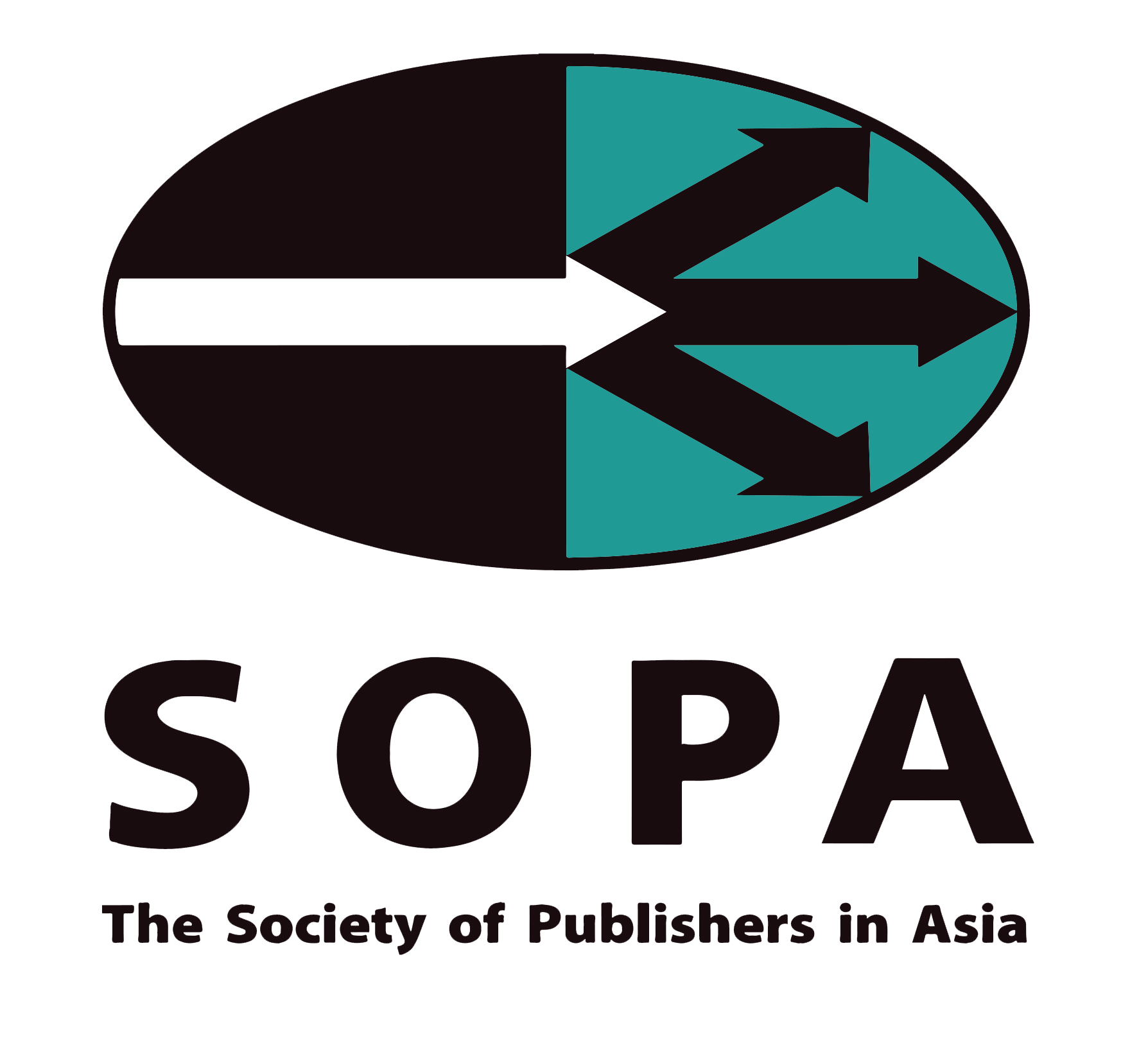
The JMSC began establishing a key partnership with the Society of Publishers in Asia (SOPA) when JMSC faculty members began serving in key roles for SOPA’s annual Awards for Editorial Excellence competition.
The awards were established in 1999 to encourage editorial vitality, raise journalistic standards and support free speech throughout the region.
In 2004, Gene Mustain, then director of the JMSC’s Reporting and Writing Programme, became the first academic to serve as the competition’s first Director of Judges, responsible for recruiting the head judges and three panel judges for each awards category. Before 2004, SOPA relied on professional journalists for the director’s role.
Other faculty members, including Doreen Weisenhaus, David Plott, Thomas Abraham and Jeffrey Timmermans, also served as Director of Judges in subsequent years. In 2011, the JMSC took over administration of the awards as well.
In 2016, Professor Chan was inducted into SOPA as an Honorary Member in recognition of lifetime achievement and contributions to journalism.

In September 2011, Google and the JMSC co-sponsored ‘Hong Kong and the Open Internet’, a conference supported by the Office of the Government Chief Information Officer for the Hong Kong government. It featured remarks by Ethan Zuckerman, Director of the Center for Civic Media at MIT.
Google also funded two full-tuition scholarships for MJ candidates for the 2012-13 academic year as part of a programme to teach journalism skills to computer scientists and specialists in related disciplines interested in pursuing a media-related career.
The scholarships provided support for the field of data journalism, one of the new areas of focus then emerging at the JMSC.
In 2015, Google supported Asia’s first Editors Lab hackday event, hosted by the JMSC and co-organised with the Global Editors Network. Google and the JMSC also collaborated In 2016, with the launch of MOOC on ‘Data Journalism Fundamentals’ supported by Google News Lab.
A year earlier, a MOOC ‘Introduction to Infographics and Data Visualization’ represented the first collaboration between the JMSC and the Knight Center for Journalism in the Americas at the University of Texas.
Asian American Journalists Association (AAJA-Asia)
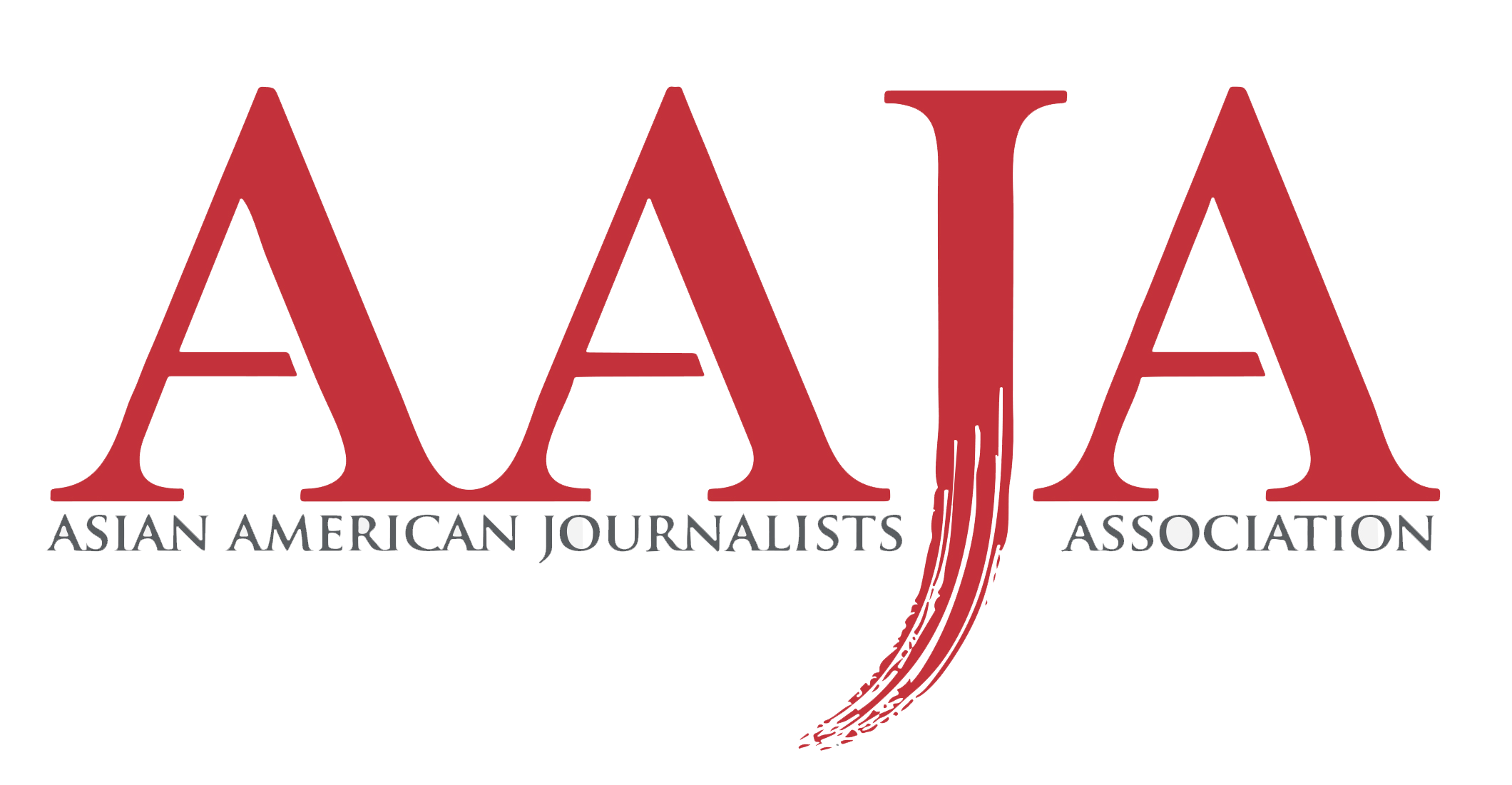
The JMSC has partnered with AAJA-Asia since 2011, when the centre hosted and provided live coverage of the AAJA’s inaugural Asia regional conference at HKU. The JMSC also was a co-organiser of the AAJA’s annual conferences in 2012, 2013 and 2014, all in Hong Kong.
The conference was known as the New Media Conference for the first two years, later becoming the New.Now.Next.Media Conference, or N3Con.
The 2016 N3Con, ‘Journalism in the Mobile Age’, was held in Seoul and attended by current JMSC staff who spoke on topics such as virtual reality in journalism and career guidance.
Center for News Literacy, Stony Brook University

In collaboration with the Center for News Literacy at Stony Brook University in the United States, the JMSC has promoted news literacy training in Asia through the Institute for News Literacy Fellows in Asia.
The Institute has been offering news literacy training to educators in annual workshops since 2012, and held its first meeting outside of Hong Kong in December 2015 at the Myanmar Institute of Theology in Yangon, Myanmar. Workshop participants learn how to teach their students the skills to judge the accuracy of information that abounds in the digital age.
East-West Center (EWC)

The JMSC’s partnership with the EWC, which promotes cooperation among people and nations, including the United States and countries in the Asia region, began in 2006 with co-sponsorship of a two-week travelling seminar for health journalists from Asia and the United States.
The seminar began in Hong Kong and continued on to Vietnam, Indonesia and China to examine avian flu, tuberculosis, HIV/AIDS and other health issues. The seminar was repeated in 2007.
In April 2010, the JMSC co-sponsored the EWC’s second biennial International Media Conference, held at HKU, with JMSC students providing live coverage of the event.
The EWC is an independent, public, non-profit organisation with funding from the US government, and additional support from private agencies, individuals, foundations, corporations, and governments.
Global Editors Network (GEN)
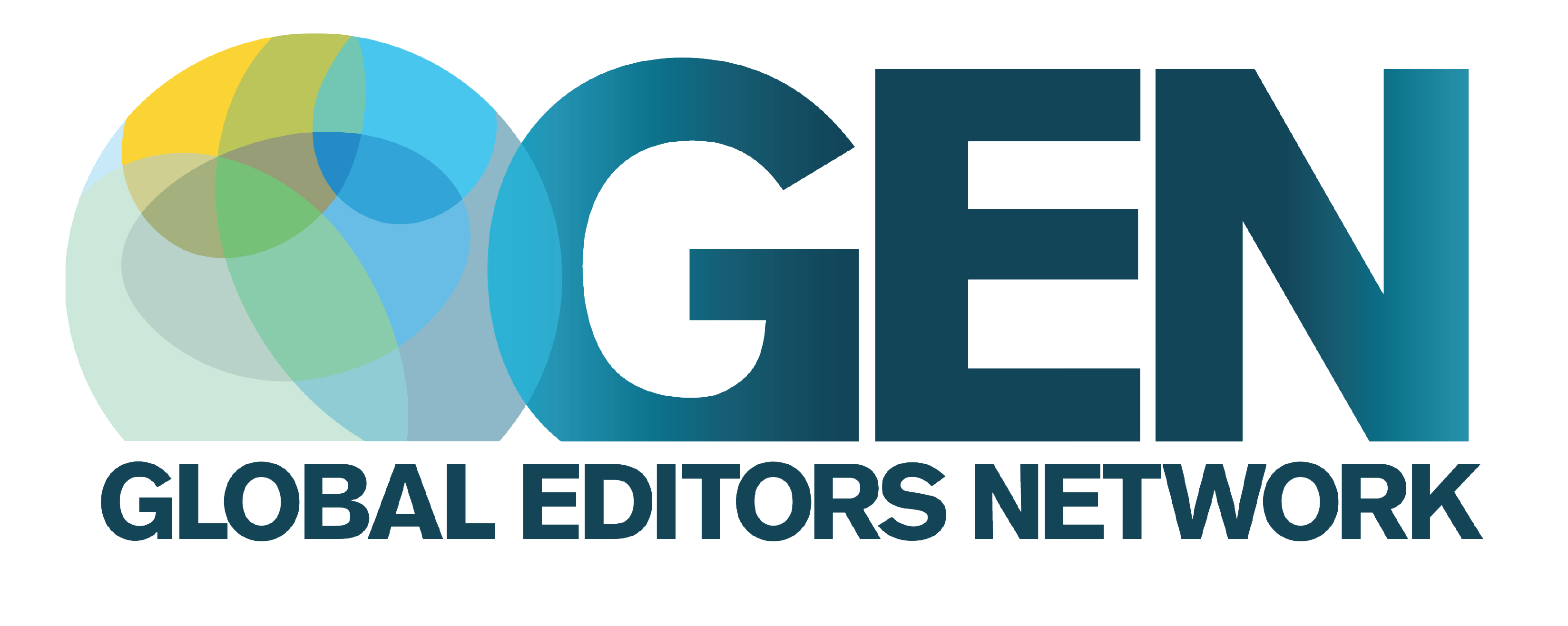
In 2015, the JMSC partnered with Global Editors Network to organise Asia’s first Editors Lab hackday event, supported by Google. Journalists and media experts from YouTube, the Associated Press, Storyful, The Economist and others kicked off the event with a series of workshops.
Nine teams from media organisations from China, Hong Kong and Malaysia (each consisting of an editor, designer and developer) then worked together across two days to build a prototype focusing on a practical problem in video journalism.
A platform named ‘Hawkeye’, developed by a team from Caixin Data Visualisation Lab in China, won the event and went on to compete against other Editors Lab winners from around the world in Vienna during June 2016. JMSC staff attended the final in Vienna to assist GEN with running the event and to further develop the partnership.
International media organisations
BBCJim Laurie’s Focus Asia Business Leaders series was first produced in 2006 and aired on BBC World News in October 2008, with six half-hour episodes. The JMSC collaborated with the Asia Case Research Centre within HKU’s Faculty of Business and Economics to produce the series, which profiled leading Asian enterprises and their senior executives. It featured companies in sectors from property development and manufacturing to biotechnology, in locations from China to Singapore, Japan and India. Click here to watch a clip from an episode in the series. |
 |
NHKIn October 2009, a team of JMSC students and alumni produced financial and economic reports for Japan national broadcaster NHK. In tandem with industry professionals such as Rob McBride, the JMSC team was responsible for the Hong Kong segment of NHK World’s flagship international news and business programme, Newsline, which broadcasts daily on the hour. The partnership has also led to internships for JMSC students, and several alumni have worked at NHK on a freelance basis. |  |
ABC NewsThe JMSC’s partnership with the American Broadcasting Company’s, ABC News on Campus, began in 2009 and was extended for a second year in 2010 with the partnership’s first international shoot in the Philippines. In March and April of 2015, other shoots took place in Cambodia and Vietnam, the latter to cover the 35th anniversary of the fall of Saigon during the Vietnam War. MJ students reporting for the project were accompanied by the JMSC’s Jim Laurie, then Director of the Broadcasting Programme, who was also there for a reunion of journalists who had covered the Vietnam War. Laurie was a correspondent in Vietnam for five years in the 1970s, reporting for NBC News. In June 2010, another field trip was organised to New York for a four-day tour of the headquarters of some of the world’s largest news organisations. The first broadcast package for the project—White Collar Fight Nights, the story of white collar Hong Kong expats turning to boxing to relieve stress, produced by students Li Li, Chen Yuanni, and Lorea Solabarrieta—aired in March 2010. |
 |
Lee Hysan Foundation

The JMSC’s partnership with the Lee Hysan Foundation, a private family charity founded in Hong Kong in 1973, began in 2014. The foundation, which contributes to several non-profit groups active in education, the environment, health and social services, and arts and culture, supported the production of JMSC Honorary Professor Ruby Yang’s documentary, My Voice, My Life.
In 2015, the foundation became the strategic partner and sponsor of the Hong Kong Documentary Initiative, and also supported The Asian Youth Orchestra (AYO) Benefit Gala Premiere of In Search of Perfect Consonance in 2016.
Open Society Foundations (OSF)

The OSF (formerly the Open Society Institute) has supported the JMSC’s work covering the media landscape in China and funded student scholarships to recognise ‘outstanding individuals who have the potential to become leading practitioners’ in their chosen fields since 2004.
In 2013, six students from Nepal and one from Bhutan were among nine scholarship winners, extending the JMSC’s reach into the remote Himalayas. OSF scholarships have provided half of the costs for overseas students’ tuition, airfares and accommodation, while the JMSC provided the rest.
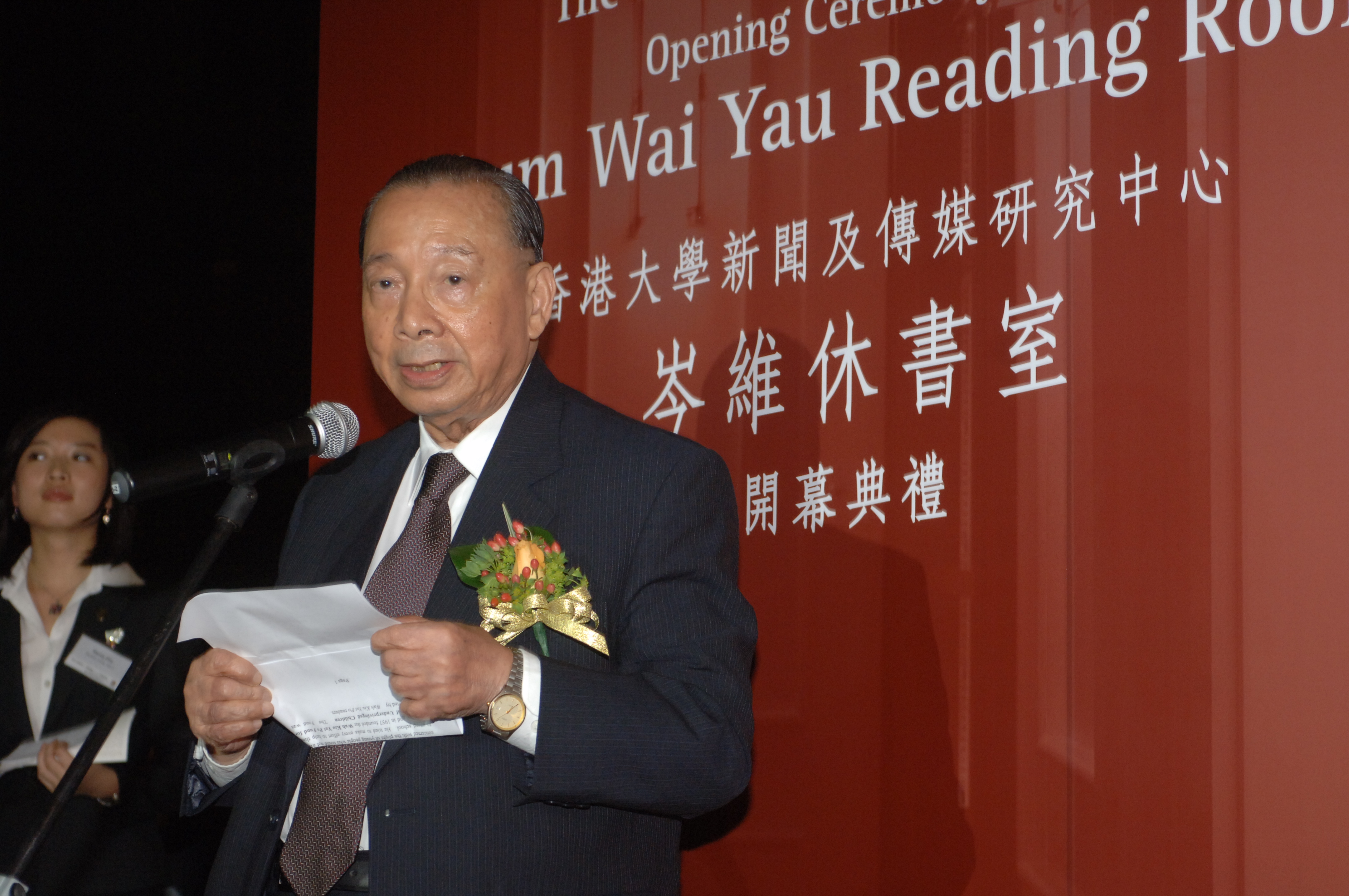
Mr Shum Choi-sang spoke at the opening of the opening of the The Shum Wai Yau Reading Room in 2005

